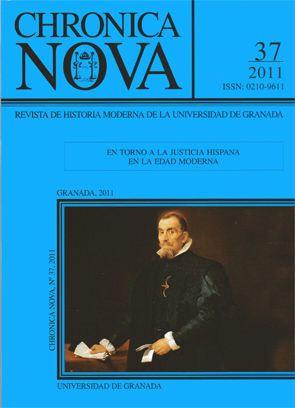Unemployment and poverty in agriculture in Lower Andalusia eighteenth century
DOI:
https://doi.org/10.30827/cn.v0i37.1608Keywords:
Agricultural worker, poverty, season unemployement, Andalusia, 18th centuryAbstract
The agricultural worker is subjected to a strong lack of job security arising from the compelling agricultural cycle, from the will of the employers and from the impacts of the meteorological phenomena. Therefore the wage employment in the rural areas is a non continous activity, with periods of employement and others of unemployment, the latter were sometimes long periods of time. As in the Modern Age did not exist any regulated extended benefits, that would allow the economic survival of the agricultural worker during the periods of unemployment, the worker turned into a pauper that earns one´s living by begging and, at times, by illegal activities. The study raises the research into the transformation process of the agricultural worker into a beggar and intends to analyze the social, economic and moral implications, as well as the impacts on the public policy that this process gives rise to. In a like manner it will be assessed the policy and action developed as a response to the mentioned problems.
Downloads
Downloads
Published
How to Cite
Issue
Section
License
Nuestra revista se atiene a las recomendaciones para la implementación del Artículo 37 Difusión en Acceso Abierto de la Ley de la Ciencia, la Tecnología y la Innovación:
- Los/as autores/as cuyas contribuciones sean aceptadas para su publicación en esta revista conservarán el derecho no exclusivo de utilizar sus contribuciones con fines académicos, de investigación y educativos, incluyendo el auto-archivo o depósito de los artículos aceptados en repositorios institucionales o temáticos de acceso abierto de cualquier tipo en un plazo máximo de seis meses.
- Preferiblemente se permitirá el uso de la versión publicada de las contribuciones científicas, que estarán accesibles en abierto tan pronto como sea posible.
-
Que en caso de que el trabajo sea aprobado para su publicación, el/la autor/a autoriza de manera ilimitada en el tiempo a la entidad editora para que incluya dicho texto en Chronica Nova y pueda reproducirlo, editarlo, distribuirlo, exhibirlo y comunicarlo en el país y en el extranjero por medios impresos, electrónicos, CD, Internet o cualquier otro medio conocido o por conocer.






 ISSN-e: 2445-1908
ISSN-e: 2445-1908










